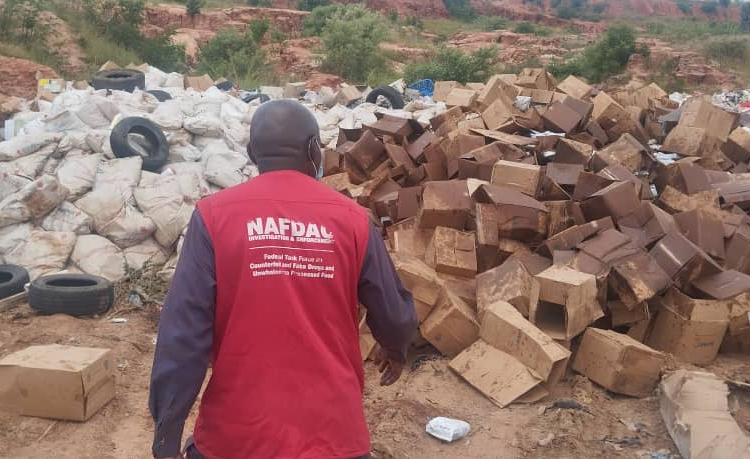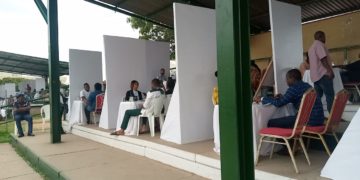The National Agency for Food and Drug Administration and Control (NAFDAC) has announced the seizure and destruction of over N120 billion of substandard and falsified medicines (SFs) and unwholesome food products between July and December 2024.
In its intensified crackdown on counterfeiters, the agency recorded significant achievements across the country. Key highlights include: the destruction of counterfeit medicines and expired products worth N11 billion on December 11, 2024, in Ibadan; the raids on counterfeit alcohol packaging centres, with seizures worth N2.3 billion, in Lagos; closure of a fake rice packaging factory and confiscation of products worth N5 billion, in Nasarawa State and a shutdown of 150 shops and seizure of fake food and beverages worth N5 billion during a two-day operation in Aba.
This is even as the agency has assured Nigerians of its intensified market surveillance and stricter enforcement measures in 2025 to protect public health.
This assurance came in a New Year message from NAFDAC’s director general, Prof. Mojisola Adeyeye.
In it, Adeyeye emphasised the need for Nigerians to prioritise safety during the festive season by purchasing only NAFDAC-registered products from reputable outlets.
She reiterated the need for Nigerians to always procure food and drinks in outlets with identifiable addresses and locations to ease the Agency’s track and trace obligation, adding that medicines and packaged food products that do not have NAFDAC numbers should be avoided. ‘’And when a product is too cheap, it’s most likely to be compromised,” she warned.
Adeyeye, however, disclosed that officers of the agency’s Investigation and Enforcement Directorate (I&E) would continue the ongoing mop-up of substandard and falsified medicines and unwholesome food items from the markets across the country. “Officials of the Agency’s Investigation and Enforcement Directorate (I&E), Pharmacovigilance (PV) Directorate and Post-Marketing Surveillance (PMS) Directorate are jointly on the field mopping up falsified medicines, fake wines and drinks and unwholesome food products that could endanger the health of the people during the festive season.
“The agency had stormed supermarkets in the big cities across the country such as Lagos, Port Harcourt, Aba, Ibadan, Kaduna, and the Federal Capital Territory (FCT), to apprehend manufacturers and merchants of fake drugs and unwholesome foods, while products running into billions of naira had been confiscated in the last three months of renewed enforcement.
“On Wednesday, December 11, 2024, the agency destroyed expired, unregistered drugs worth N11 billion in Ibadan, Oyo State. In November, the agency seized N300m worth of fake medicines during a Tyre Village, Trade Fair Complex, Lagos State raid. Officers of the agency also burst counterfeit alcohol packaging centres and seized items worth N2billion in Lagos. This followed reports of illegal revalidation of expired alcoholic beverages at the Trade Fair Complex in Lagos,” she revealed.
Adeyeye maintained that only safe, quality, and wholesome food products should be available to Nigerians during the yuletide and beyond. She specifically instructed that those counterfeiting popular rice brands should be arrested and their products removed from the market.
The DG, however, stated that the agency would not rest on its oars until the merchants of death were forced out of operation, warning that the agency would make it hard for them to operate freely and endanger the health of innocent consumers.
‘The coming year will be tough for the people that prioritise money over the wellbeing of their fellow human beings by compromising the quality of medicines and food products in the country’, she said.
She urged consumers to scrutinise medicines and branded drinks consistently and carefully to distinguish genuine products from counterfeits before consumption.
“NAFDAC wishes to advise that the members of the public should be vigilant during this yuletide season.
‘’We are using this medium to appeal to Nigerians to buy only NAFDAC-registered drinks from reputable and licenced retailers, bars and supermarkets. If the product is sold well below its normal price or doesn’t seem to include normal taxes on liquors, it is probably fake. Check for poor quality packaging, spelling mistakes and unusually shaped bottles. Healthcare professionals and consumers are advised to report any suspicion of substandard and falsified medicines or food to the nearest NAFDAC office,” she stated.





